On July 2, 1863, Joshua Chamberlain's heroics at the Battle of Gettysburg helped the Union Army emerge victorious.
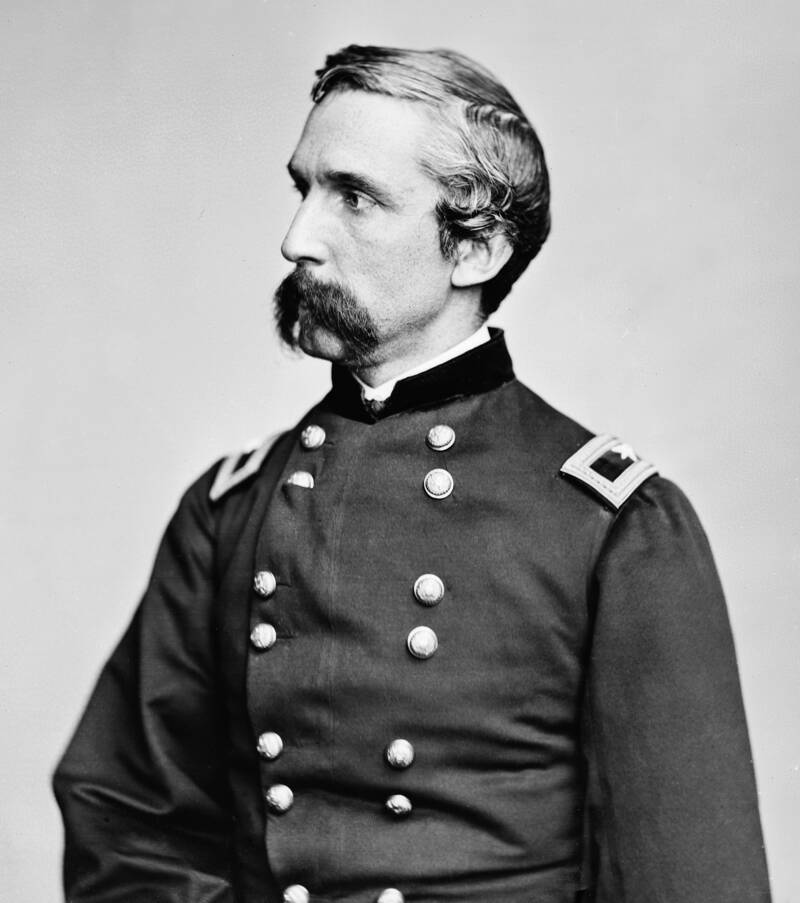
Library of CongressJoshua Chamberlain had a distinguished career as a professor, a soldier, and a politician.
By the time the Civil War broke out in 1861, Joshua Chamberlain had settled into a comfortable life as a professor of languages and rhetoric at Bowdoin College in Maine. Though school administrators would have protected him from the conflict, Chamberlain was determined to do his part and set out to enlist with the Union Army.
During the war, the professor-turned-soldier proved himself on the battlefield and famously led a Maine regiment during the Battle of Gettysburg. There, his desperate offensive charge with bayonets repelled Confederate troops and may have changed the course of the war.
But that’s not all that this college professor accomplished. Discover the incredible life of Joshua Chamberlain, the Civil War hero depicted by Jeff Daniels in the 1993 film Gettysburg.
From A Boy With A Stutter To A Professor Of Rhetoric
Born on Sept. 8, 1828, in Brewer, Maine, Joshua Chamberlain grew up with a great appreciation for the military. The National Park Service writes that Chamberlain’s family had fought in a number of American wars, and he grew up hearing stories about their service. But Chamberlain, studious and struggling with a childhood stutter, drifted toward academia instead.
As a young man, Chamberlain studied at Bowdoin College under Calvin Stowe, whose wife, abolitionist Harriet Beecher Stowe, wrote Uncle Tom’s Cabin (1852). After graduating college, Chamberlain attended Bangor Theological Seminary and married his wife, Fannie, before returning to Bowdoin to teach languages and rhetoric in 1855. But his life would change dramatically a few years later.
Then, in 1861, the Civil War broke out. Chamberlain was in his thirties and able to fight, but college administrators at Bowdoin wanted him to stay and teach. Instead, Chamberlain reached out to the governor of Maine.
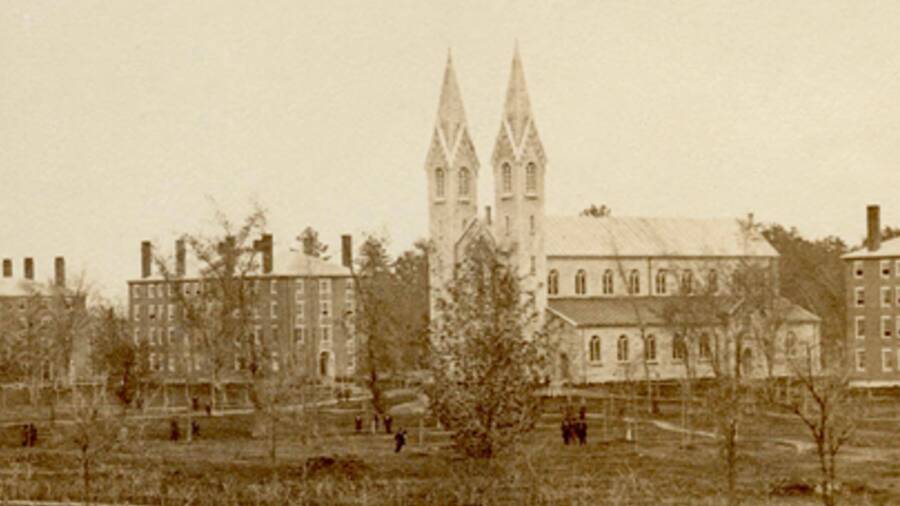
Brown University LibraryBowdoin College circa 1860.
“I have always been interested in military matters,” he wrote, according to Biography, “and what I do not know in that line I am willing to learn.”
Joshua Chamberlain was appointed the Lieutenant Colonel of the newly formed 20th Maine regiment in the summer of 1862. Before long, he had a chance to apply what he’d learned in his study of war to real-life battles.
How Joshua Chamberlain Became A Civil War Hero At Gettysburg
As the American Battlefield Trust writes, it didn’t take long before Joshua Chamberlain saw action. He and his men fought at Marye’s Heights during the Battle of Fredericksburg and performed guard duty at Chancellorsville after a bout of smallpox infected much of the regiment.
But Chamberlain would especially distinguish himself during the Battle of Gettysburg in July 1863. By then, Chamberlain had taken command of his regiment. And during the pivotal battle, which lasted from July 1 until July 3, Chamberlain and his men made a fateful decision.
While facing repeated attacks from Confederate General John B. Hood, the men of the 20th Maine regiment suddenly found themselves running low on ammunition. They knew they had to hold their crucial position at Little Round Top, so the regiment executed a risky, desperate maneuver.
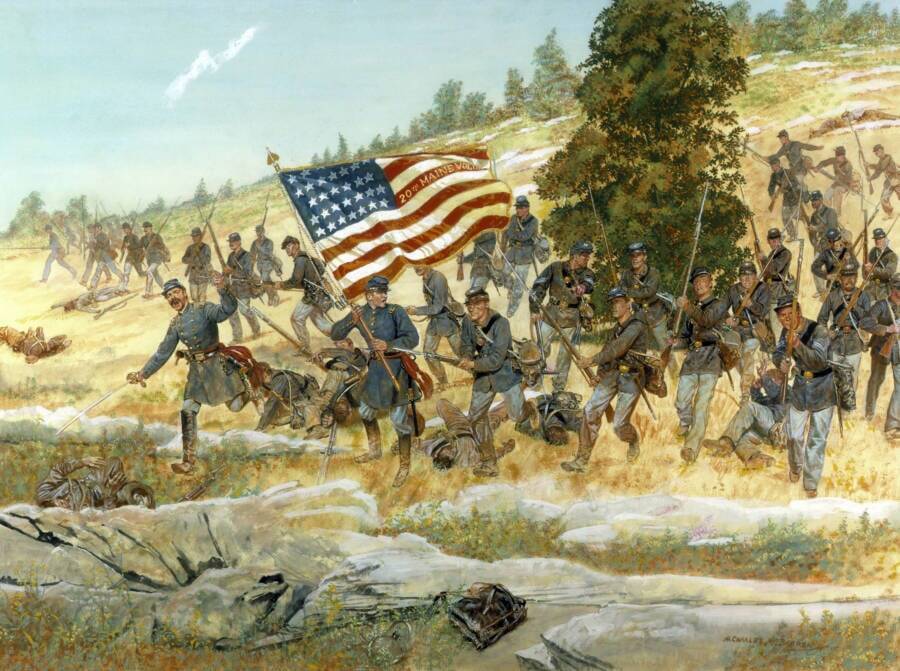
VCG Wilson/Corbis via Getty ImagesA depiction of Joshua Chamberlain leading the 20th Maine regiment in a charge during the Battle of Gettysburg.
“My men were firing their last shot and getting ready to ‘club’ their muskets,” Chamberlain later explained in the U.S. Congressional Record. “It was imperative to strike before we were struck by this overwhelming force in a hand-to-hand fight, which we could not probably have withstood or survived. At that crisis, I ordered the bayonet.”
To the shock of their Confederate foes, Chamberlain and the 20th regiment charged straight toward them with nothing but bayonets. Fox News writes that their sudden, brave charge obliterated four Confederate regiments, and resulted in 2,000 Confederate casualties.
And it made Joshua Chamberlain a hero. The National Park Service reports that the college professor was thus dubbed the “Lion of Little Round Top” and was later awarded the Medal of Honor for “conspicuous gallantry.”
Thanks to his actions, and the bravery of his men, Chamberlain arguably turned the tides of the Battle of Gettysburg — and the Civil War itself. The Confederates had hoped that their invasion of the North would force peace but, defeated at Gettysburg, they were forced to retreat.
The Civil War would instead continue for another two years, and Joshua Chamberlain would continue to fight for the Union cause.
From Gettysburg To The Governorship
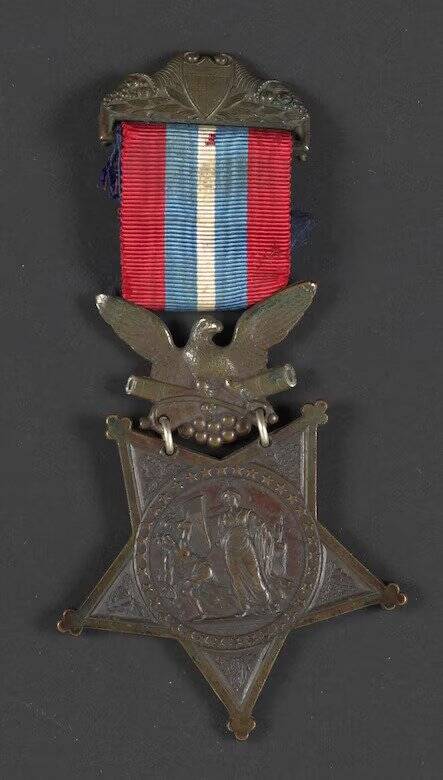
Department of DefenseJoshua Chamberlain’s Medal of Honor for “conspicuous gallantry.”
As the Civil War dragged to a close, Joshua Chamberlain continued to play an important role in the conflict. He fought at the Battle of Petersburg in 1864 — narrowly surviving a near-fatal hip and groin injury — and was present at Appomattox during the Confederate surrender.
Then, Lieutenant General Ulysses S. Grant tapped Chamberlain to receive Confederate general John B. Gordon’s surrender (Robert E. Lee had already surrendered to Grant by then). Chamberlain took his responsibilities seriously and ordered his men to attention as a sign of respect.
“Grant wished the ceremony to be as simple as possible, and that nothing should be done to humiliate the manhood of the southern soldiers,” Chamberlain later wrote of the surrender in his book about the end of the Civil War, The Passing of the Armies (1915).
He ended the war as a brigadier general and returned to his life in Maine. There, Chamberlain served four terms as the state’s governor, and later became the president of Bowdoin College.
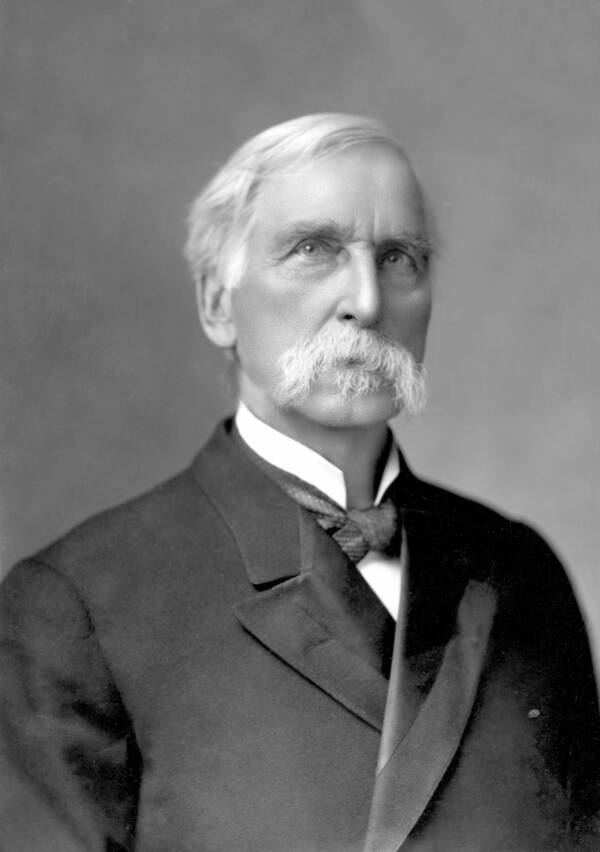
Portland Press Herald via Getty ImagesJoshua Chamberlain’s accomplishments continued long after the Civil War ended.
When Joshua Chamberlain died on Feb. 24, 1914, at the age of 85, his cause of death was attributed to the wounds he’d suffered during the war. That made him the last Civil War veteran to die of war-related wounds, according to the Department of Defense.
But Chamberlain’s story didn’t end there. Stories of his bravery during the Battle of Gettysburg echoed through the ages — despite the debate over who exactly gave the order to charge — and were featured in the Hollywood film Gettysburg in 1993.
That film breathed new life into Joshua Chamberlain’s legacy — and ensured that the “Lion of Little Round Top” would not be forgotten.
After reading about Joshua Chamberlain, the college professor turned Civil War hero, look through these colorized Civil War photos that bring the conflict to life. Or, go inside the surprisingly complicated question of when the Civil War ended.





